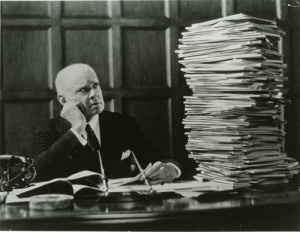To help students adapt to the changing job market, the AHA has begun a new series on searching for jobs and developing careers with a BA in history. This first post in the series focuses on techniques for conducting your search.
In the last 10 days I met with three history majors in my office to develop strategies for building their careers. The first student wanted to work in the Los Angeles area in some form of museum, archive, or historical site. The second wanted to teach history but prior to entering a credential program wanted to experience the world by teaching English abroad. The third student didn’t have a firm career goal but was leaning toward business: sales or marketing. The advice for each of these students did not change based on their target careers: learn to market what you’ve learned and earned, explore where you want to be, and target the employers you want to work for and approach them before they are approached by someone else who wants your job.
In You Majored in What, a must-read book for any job-hunting liberal arts major, Katherine Brooks addresses the question all history majors receive: “What are you going to do with that degree?” In any economy, but especially in a constricted one like we’ve seen these last few years, people begin to expect and hope for a very linear path from your education to your career. When history majors are asked about their career plans, the person asking is likely waiting to hear “teacher,” “pre-law,” or maybe “government.” As Brooks points out, however, the stats, numbers, and design of a humanities education should allow you to answer, “I’m going to do whatever I want.”
History degrees are versatile, viable, and valuable, but so often they are not understood or marketed on these terms. You may have chosen history because you had visions of devouring stacks of ancient primary source documents in a glorious repository in an ancient European metropolis. Or maybe you dreamt of standing in front of a high school class much like your own high school history class, waking the heart of a high school student a lot like you once were. Or, like many of us, you simply chose the major because you liked it and you knew you’d have to figure out a job down the road. Whatever your motivation, the first thing you need to learn is how to market your degree.
History is dynamic, and you should be a bright, capable, and thorough thinker, writer, communicator, and researcher because of your time as an undergraduate. The problem is that no one will know it until you tell them! People make assumptions about various majors all the time, and in the news they often recite and rehash false stories about college education that go unchallenged. On your resume, in your cover letter, and during interviews and networking scenarios you need to quantify your experience in terms employers can understand and change the common perceptions out there. Your ability to do this can make all the difference. According to the National Association of Colleges and Employers, employers cite the following as the top skills employers look for in college graduates:
- Communication
- Teamwork
- Making decisions/solving problems
- Planning, organizing, and prioritizing
- Obtaining and processing information
- Analyzing quantitative data
- Technical skills related to the job
- Using computer software
- Creating and editing written reports
- Selling/influencing others
With a degree in history and all that comes along with being a graduate from a four-year university in our day and age, you should feel confident putting your education and your experience in this kind of language for employers to understand.
After learning to market yourself you need to explore the field. Where do you want to work? Some of us know immediately, while others of us are figuring it out as we go. Search a variety of job ad sources, and interview people in the fields you are interested in. You’d be surprised how quickly people will agree to talk to you for 15–20 minutes about their profession. Explore careers with a career assessment at your college’s career center. Ideally, if you are reading this a year or two before graduation, get some hours in somewhere that will give you knowledge in the field that interests you. Many businesses, libraries, and museums offer part-time jobs or internships. If you want to work in politics, volunteer on election day, join a campaign, or get involved in student government. If you are considering graduate school, spend time with your faculty, ask if you can assist in their research, TA for a class, or become a tutor.
Lastly, once you are nearing graduation you need to think about where you want to live and begin to target the right employers. Find the four or five ad sources for jobs in that area, take a tour through the ads, and get a feel for what is out there. More importantly, make a list of all the places in the area you want to work. If you want to work in a museum, then list all the museums in that location; the American Alliance of Museums is a great place to start. Then go talk to them one-by-one until a position opens up. Visit them every couple weeks to maintain the connection; make sure they know you want to work there more than anyone else. An informational interview here can give you the kind of foot in the door you are dreaming of. If it’s business—say, advertising or insurance—hit all the agencies in town. If it’s politics, list every representative, every party office, and every campaign headquarters that you are willing to work for. The reason this is the make-or-break of how closely you hit the target for your dream job is the fact that only 20% of all jobs out there will ever make it into an advertisement; someone is knocking at the door at the right time before the ad goes up.
My bachelor’s degree is in history. In my senior year, Professor Anne Paulet told our class to make sure employers knew that our degrees meant that we could read, write, and communicate better than almost anybody. I’ve taken that advice and it’s shaped the kind of career adviser to liberal arts students I have become and the quality of job seeker I became. Know how to market your excellent education, explore where you want to put it to use, and talk to all the right employers before they ask for it. It will make all the difference in finding the job you want.
Next Post: Career Planning as an Undergraduate in History
Sources
Brooks, Katherine S. Connecting Students to Careers: Training and Instruction Guide. Sacramento, CA: California Community College Chancellor’s Office, 2010–11.
———. You Majored in What? Mapping Your Path from Chaos to Career. New York: Viking, 2009.
Dickler, Jessica. “The Hidden Job Market.” CNNMoney. https://money.cnn.com/2009/06/09/news/economy/hidden_jobs/.
National Association of Colleges and Employers, “Job Outlook 2015.” Bethlehem, PA: NACE, 2015.
About the Author
Loren Collins is a career adviser at Humboldt State University working on integrating career curricula into liberal arts coursework. He has a credential in career development, a BA in history and is earning a graduate degree in sociology, both from Humboldt State University. He avidly claims that his degree in history was excellent preparation for all these endeavors.
This post first appeared on AHA Today.
This work is licensed under a Creative Commons Attribution-NonCommercial-NoDerivatives 4.0 International License. Attribution must provide author name, article title, Perspectives on History, date of publication, and a link to this page. This license applies only to the article, not to text or images used here by permission.




